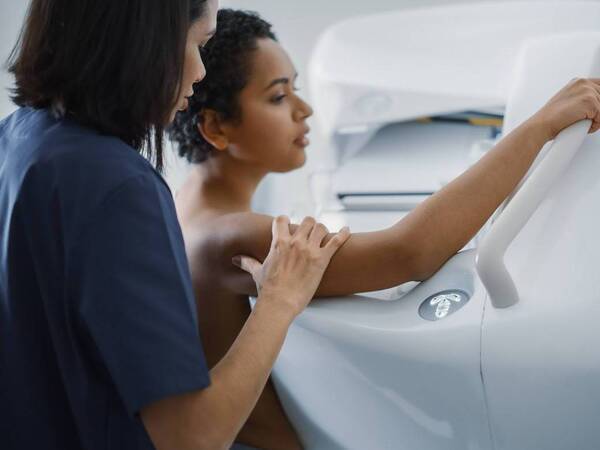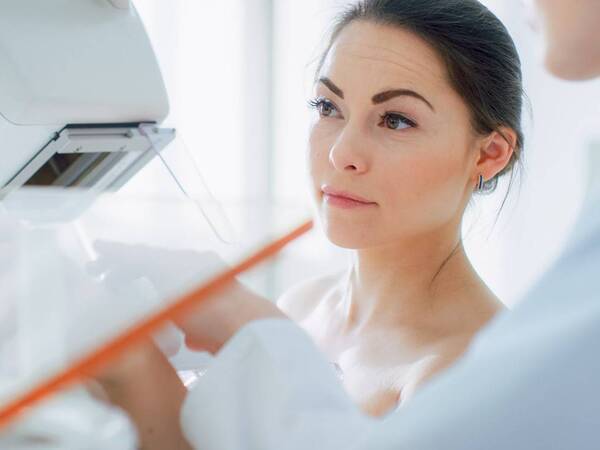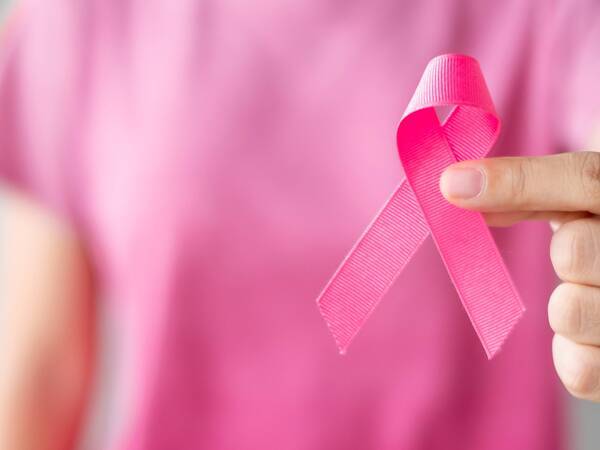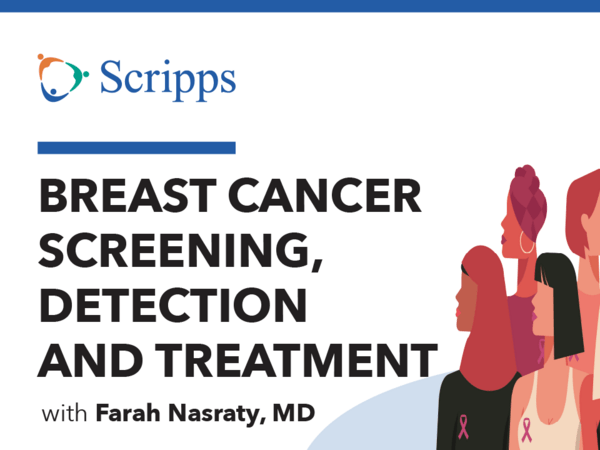
Scripps breast care specialists offer breast imaging and support services in La Jolla
At the Dunn Breast Care Center, we provide personalized, compassionate care for women of all ages. We offer the full range of breast health services to help you maintain your breast health. Whether you’re coming in for an annual mammogram or seeking support while living with breast cancer, our team is here to guide you with expertise and understanding.
Located on the ground floor of the XiMED building on the campus of Scripps Memorial Hospital La Jolla. Download and print our campus map (PDF, 850 KB).
How to find us
About this location
Phone Numbers
- Phone
- 858-626-5200
Hours
- Imaging Hours
Mammography: Mon - Fri 7 am - 4:30 pm
Ultrasound: Mon - Fri 7 am - 4:30 pm
Amenities
Our mission is to enhance each patient’s well-being through exceptional, individualized care. As part of Scripps Health, we offer comprehensive breast health services in collaboration with experienced physician specialists. The Dunn Breast Care Center is proud to be accredited by the American College of Radiology, the American College of Surgeons and The Joint Commission.
We’re committed to early detection and personalized treatment, as well as providing emotional support in a welcoming environment where patients feel informed, respected and empowered to make the best decisions for their health. Our dedicated staff provides sensitive, specialized care for women that combines clinical excellence with genuine compassion, ensuring the highest quality care in a calm and reassuring setting.
Information for patients and visitors
Dunn Breast Care Center is located on a busy medical campus with Scripps Memorial Hospital La Jolla. Below you’ll find tips to make your visit as seamless as possible.
Dunn Breast Care Center is the first in San Diego to offer personalized, compassionate breast care in one convenient location, including:
Experience and expertise
Your breast care team, including experienced health care professionals, registered nurses and physicians, works with the latest imaging technology for screening and diagnosis. Digital mammography and breast MRI enables us to save valuable time in diagnosing cancer, so we can begin treatment right away.
Early detection
Screening and diagnosis takes place in a warm, friendly environment. On-site radiologists provide timely test results. A computer-aided detection system analyzes all digital screening mammograms, resulting in a high level of accuracy. A registered nurse is available to provide education on self breast exams.
Education and support
We offer the latest information on every aspect of breast care, from prevention and detection to treatment and therapy. Our registered nurses provide community outreach and education on breast cancer, self-exam techniques and general breast health. Women living with breast cancer can talk with counselors, join a support group and meet with breast cancer survivors.
Personalized care
We are dedicated to giving you the personal care you deserve. We listen to your concerns and work with you to make informed decisions. We encourage you and your family to ask questions and take an active role in your care.
Regular mammography exams are the best way to detect any breast problems early on, when treatment can be most successful. We use the advanced imaging technology to get detailed, accurate images of your breast tissue. Our expert radiologists who specialize in breast care perform the imaging scans and analyze the results.
Imaging services we provide include:
Mammography
This uses low-dose radiation to obtain high-resolution images of your breasts. We provide two types:
- Digital mammography, analyzed by a computer-aided detection (CAD) system. We use this for both screening and diagnostic purposes. Find out more about digital mammography.
- 3-D mammography (tomosynthesis), which provides the sharpest images for screening and diagnostics.
Ultrasounds
An ultrasound procedure uses a microphone-like instrument to scan over the skin and send sound waves into the body that bounce off of tissue and reflect back to the transducer, where they are recorded and displayed as real-time images.
Breast biopsies
We remove a small sample of breast tissue for analysis, using the latest technology to ensure the most accurate and least invasive procedure.
- Ultrasound-guided breast biopsy
- Stereotactic breast biopsy
Molecular breast imaging (MBI)
This can identify tumors that are not visible in a traditional mammogram. We inject short-lived radioactive particles that accumulate in tumor cells more than normal cells, allowing us to detect abnormalities.
Breast MRI
This helps us to determine the extent of disease, monitor response to therapy in breast cancer patients and further evaluate any breast abnormalities. Read more about breast MRI.
Needle localization prior to surgery
Our team uses needle localization to accurately identify the location of the breast abnormality before beginning surgery.
Dunn Breast Care Center offers comprehensive, coordinated care for the full spectrum of breast care. Our caring staff focuses on meeting your individual needs. Services we provide include:
Education and consultation services
- Instruction on breast self-exam
- Education about your breast health
- Breast cancer education and consultation
- A reference library offering educational materials for loan and Internet access for browsing online resources
- Genetic education and testing services
Therapy programs and support services
Support groups for women with breast cancer, free of charge. You do not have to be a Scripps patient to participate.
- The lymphedema management program offers an individualized treatment program that incorporates physical and occupational therapy.
- The Breast Buddy peer support program matches a breast cancer survivor with a patient to provide support through diagnosis, treatment and recovery of breast cancer.
Wellness programs
- Healthy lifestyle programs
- Nutritional counseling
Breast cancer treatment service
Breast surgery, radiation therapy and chemotherapy are available at Scripps La Jolla and throughout the Scripps system.
At the Dunn Breast Care Center, you will meet with experienced health care professionals, registered nurses and physicians who are part of your breast care team.
We listen to your concerns and work with you to make informed decisions. We encourage you and your family to ask questions and take an active role in your care.
Our ongoing commitment to provide you with the most advanced breast health resources includes:
- Participation in clinical research studies for breast cancer prevention and treatment.
- Our team collaborates with resources in the community to further increase breast care awareness, education, treatment and support.
- You and your family will have access to the latest information on every aspect of breast care, from prevention and detection to treatment and therapy. Our reference library is filled with up-to-date educational material for your convenience.
Our support groups are facilitated by licensed professionals and are open to everyone. Support groups are free and you do not have to be a Scripps patient to join us. If you would like additional information, please call 858-626-5207.
If breast and ovarian cancer are in your family history, you may have a genetic mutation that increases your risk for these forms of cancer. The Dunn Breast Care Center offers educational resources on identifying and managing hereditary breast cancer and ovarian cancer, and assistance in the testing process.
If have experienced any of the following in your health history, you may be interested in learning more about what you can do to lower your risk:
- Diagnosis of breast cancer before age 50
- Multiple cancer diagnoses
- One or more family members with ovarian cancer (any age)
- Two or more family members with breast cancer, diagnosed before age 50
- Male relative diagnosed with breast cancer
- One or more family members with breast cancer diagnosed before age 50 and Ashkenazi Jewish ancestry
- Known BRCA1/BRCA2 mutation in the family
Genetic testing
A blood test can determine whether you have a BRCA1 or BRAC2 gene mutation, which are responsible for approximately 5% of all breast and ovarian cancers diagnosed. Women with BRCA mutations have:
- Approximately an 87% chance of developing breast cancer, and approximately a 44% chance of developing ovarian cancer by age 70
- A higher risk of developing secondary cancers
Genetic information can help you and your health care providers manage your health care needs more effectively. Many insurance plans cover a large portion of the cost of this test. It is important to know that the Federal Health Insurance Portability and Accountability Act of 1996 prohibits health insurance discrimination based on genetic information.
Next steps
Women who carry a mutation in the BRCA gene are encouraged to talk to their physicians or medical providers about ways to reduce their risk.
Recommendations may include:
- Increased surveillance — Monthly breast self-exams and annual clinical breast exams, mammograms, transvaginal ultrasound and CA 125 blood tests.
- Preventive drug therapy — For women who carry the BRCA mutation, Tamoxifen has been shown to reduce the risk of breast cancer and oral contraceptives have been shown to reduce the risk of ovarian cancer.
- Preventive surgery — Prophylactic mastectomy can significantly reduce the risk of breast cancer, and prophylactic oophorectomy (removal of ovaries and fallopian tubes) reduces the risk of ovarian cancer and may reduce the risk of breast cancer in women who carry BRCA mutations.
Knowing your risk and doing everything you can to lower it could make a big difference for you, your family and future medical management choices.
Scripps Memorial Hospital La Jolla’s main entrance is on Genesee Avenue, between I-5 and Campus Point Drive. Once you enter our driveway, follow the signs to your destination. Download and print our campus map (PDF, 850 KB).
We offer paid parking in several locations throughout the campus:
Underground Parking Structure A, located beneath Scripps Memorial Hospital La Jolla (9888 building)Parking Structures B, located next to XiMED Medical Center (9850 building) Parking Structure D, connected by bridge to Anderson Medical Pavilion (9898 building)Limited, open-air parking for emergency room patients and visitors in front of the Barbey Family Emergency and Trauma Center
Scripps charges for parking after 30 minutes. We also offer valet parking for a flat fee. Our rates are as follows:
- First 30 minutes: Free
- 31 minutes to 4 hours: $6
- 4 hours to all day: $12
- Maximum per day: $12
- Valet parking: $8
Self-parking for disabled visitors and clergy is free. Visitors with disabilities must present their parking placards to parking gate attendants. After valet hours, please visit the information desk. Clergy can receive validation from the hospital security office.
A discounted parking voucher is available to patients who require treatment three or more times in a single week.
Parking fees must be paid using our self-pay kiosks. They accept all payment types (cash, debit and credit cards) and are conveniently located throughout the campus:
In front of Scripps Memorial Hospital La Jolla (9888 building), near the fountainIn the elevator lobby within Parking Structure B Inside Parking Structure D
If you prefer to pay with cash, an ATM is located on the lower level of Scripps Memorial Hospital La Jolla (9888 building), near the elevators.
Services at this location
Mammograms and Breast Imaging

Mammograms and Breast Imaging
Learn about the advanced breast imaging technology at Scripps in San Diego, including 3D mammograms, breast MRI, breast ultrasound and BSGI.
Breast Cancer

Breast Cancer
Scripps offers a wide range of breast cancer prevention, diagnosis and treatment options for women. Learn more on our comprehensive, patient-first approach.
Related Providers
Related News
Can You Get a Mammogram with Breast Implants?

Can You Get a Mammogram with Breast Implants?
Yes, but make sure to find a breast care center that has experience doing mammograms with breast implants. Don't skip your mammogram.
How Does Breast Surgery Affect Cancer Screenings?

How Does Breast Surgery Affect Cancer Screenings?
Mammograms after breast surgery are recommended depending on the type of surgery you had. A Scripps breast cancer surgeon explains.
What To Do If You Find A Lump During a Breast Self-Exam?

What To Do If You Find A Lump During a Breast Self-Exam?
Most breast lumps are benign but should not be ignored. Learn what to do if you find a lump during a breast self-exam.
Leaders In Cancer Care

Leaders In Cancer Care
Scripps Cancer Center’s patient-focused care and collaborative team approach drive innovation and better outcomes. Learn our history.
Early Detection of Breast Cancer Saves Lives

Early Detection of Breast Cancer Saves Lives
Practicing breast awareness, screening mammograms and genetic counseling can help catch breast cancer early when it is easier to treat.
Advances in Breast Cancer Diagnosis and Treatment (video/podcast)

Advances in Breast Cancer Diagnosis and Treatment (video/podcast)
In this video/podcast, Scripps oncologist Farah Nasraty, MD, explains how advances in breast cancer treatment are saving more lives.